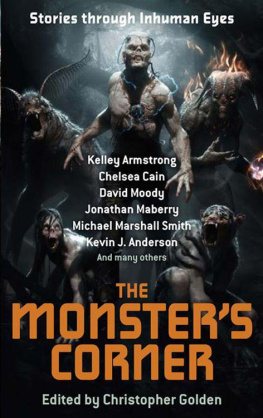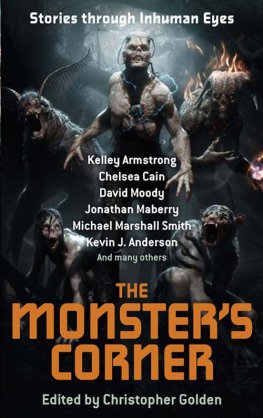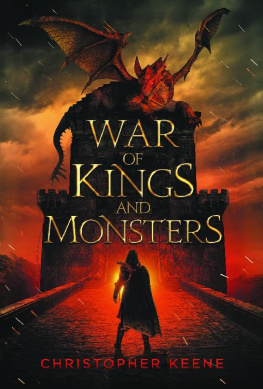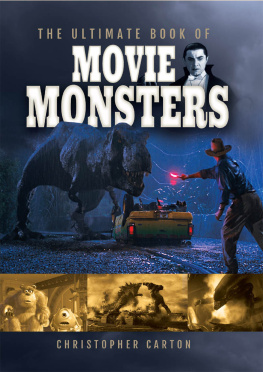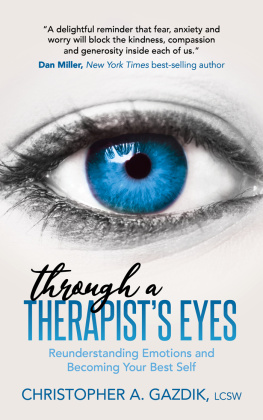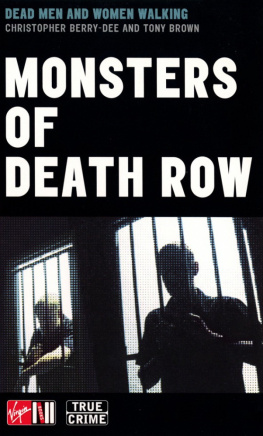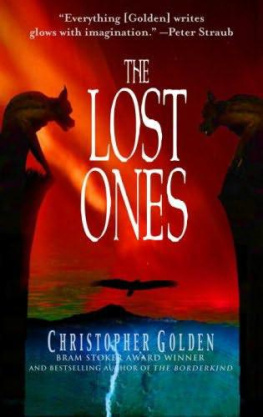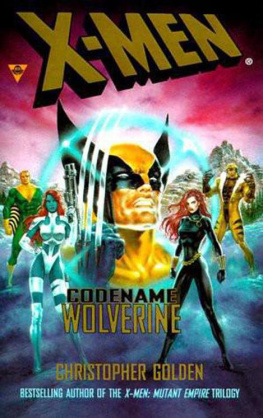Ed.Christopher Golden - The Monsters Corner: Stories Through Inhuman Eyes
Here you can read online Ed.Christopher Golden - The Monsters Corner: Stories Through Inhuman Eyes full text of the book (entire story) in english for free. Download pdf and epub, get meaning, cover and reviews about this ebook. year: 2011, publisher: Hachette Digital, genre: Art. Description of the work, (preface) as well as reviews are available. Best literature library LitArk.com created for fans of good reading and offers a wide selection of genres:
Romance novel
Science fiction
Adventure
Detective
Science
History
Home and family
Prose
Art
Politics
Computer
Non-fiction
Religion
Business
Children
Humor
Choose a favorite category and find really read worthwhile books. Enjoy immersion in the world of imagination, feel the emotions of the characters or learn something new for yourself, make an fascinating discovery.
- Book:The Monsters Corner: Stories Through Inhuman Eyes
- Author:
- Publisher:Hachette Digital
- Genre:
- Year:2011
- Rating:5 / 5
- Favourites:Add to favourites
- Your mark:
- 100
- 1
- 2
- 3
- 4
- 5
The Monsters Corner: Stories Through Inhuman Eyes: summary, description and annotation
We offer to read an annotation, description, summary or preface (depends on what the author of the book "The Monsters Corner: Stories Through Inhuman Eyes" wrote himself). If you haven't found the necessary information about the book — write in the comments, we will try to find it.
The Monsters Corner: Stories Through Inhuman Eyes — read online for free the complete book (whole text) full work
Below is the text of the book, divided by pages. System saving the place of the last page read, allows you to conveniently read the book "The Monsters Corner: Stories Through Inhuman Eyes" online for free, without having to search again every time where you left off. Put a bookmark, and you can go to the page where you finished reading at any time.
Font size:
Interval:
Bookmark:
Zombie: An Anthology of the Undead
Published by Hachette Digital
ISBN: 9780748132218
All characters and events in this publication, other than those clearly in the public domain, are fictitious and any resemblance to real persons, living or dead, is purely coincidental.
Copyright 2011 by Christopher Golden
All rights reserved. No part of this publication may be reproduced, stored in a retrieval system, or transmitted, in any form or by any means, without the prior permission in writing of the publisher.
Hachette Digital
Little, Brown Book Group
100 Victoria Embankment
London, EC4Y 0DY
www.hachette.co.uk.
The Awkward Age copyright 2011 by David Liss
Saint John copyright 2011 by Jonathan Maberry
Rue copyright 2011 by Lauren Groff
Succumb copyright 2011 by John McIlveen
Torn Stitches, Shattered Glass copyright 2011 by WordFire, Inc.
Rattler and the Mothman copyright 2011 by Sharyn McCrumb
Big Man copyright 2011 by David Moody
Rakshasi copyright 2011 by Kelley Armstrong
Breeding the Demons copyright 2010 by Nate Kenyon. Breeding the Demons first appeared in When the Night Comes Down, edited by Bill Breedlove and published by Dark Arts.
Siren Song copyright 2011 by Dana Stabenow
Less of a Girl copyright 2011 by Chelsea Cain
The Cruel Thief of Rosy Infants copyright 2011 by Tom Piccirilli
The Screaming Room copyright 2011 by Sarah Pinborough
Wicked Be copyright 2011 by Heather Graham
Specimen 313 copyright 2011 by Jeff Strand
The Lake copyright 2011 by Tananarive Due
The Other One copyright 2011 by Michael Marshall Smith
And Still You Wonder Why Our First Impulse Is to Kill You: An Alphabetized Faux-Manifesto transcribed, edited, and annotated (under duress and protest) copyright 2011 by Gary A. Braunbeck
Jesus and Satan Go Jogging in the Desert copyright 2011 by Simon R. Green
AND STILL YOU WONDER WHY OUR FIRST IMPULSE IS TO KILL YOU:
AN ALPHABETIZED FAUX-MANIFESTO transcribed, edited,
and annotated (under duress and protest)
by Gary A. Braunbeck by Gary A. Braunbeck
JESUS AND SATAN GO JOGGING IN THE DESERT
by Simon R. Green
ANYONE WHO HAS EVER READ my work, or even glanced at my Website, will already know that I love monsters. Not in the manner of some passing fancy, the way teenagers express theirOMGlove for those shoes, that dress, this hat. Nor can my love for monsters be compared to your love of ice cream or pizza or pad thai or whatever makes you salivate. It is an enduring love. A love that comes with a deep and abiding connection, an understanding, a knowing.
One of my earliest childhood memories is of sitting on the back porch of my house on Fox Hill Road in Framingham, Massachusetts, with the little black-and-white TV my mother sometimes had on in the kitchen and watching Frankenstein for the first time. I might have been seven. When the monster finds a moment of joy with the little girl by the lake, laughing with her and tossing flower petals into the water until she is the only flower remaining to be plucked and cast
Wow.
The moment terrified me and broke my heart, all at the same time. The monster didnt know any better. He didnt understand the world into which he had been thrust. He had been created with the power to do so much damage, to inflict so much brutality, and yet all he wanted was peace and laughter. When the monster is shown walking into the village with the dead girl in his arms and the villagers react with horror and hatred, the tragedy is complete.
I cried that day. Im sure I cried in horror and in fear, but I know that my tears also sprang from my sadness for this creature whose monstrosity is no fault of his own.
In the years that followed, I developed a love for all kinds of monsters, thanks in large part to a television landscape that included Creature Double Feature and local programmers who filled their airwaves with Japanese giant monster movies, 1950s atomic nightmares, Hammer horror classics, and others in that vein. But it wasnt just the movies. My favorite Bugs Bunny cartoons always had monsters in them. When I started reading comic booksor, rather, buying them on my ownI gravitated toward the wonderful horror comics Marvel published in the 1970s.
While there are monsters who are simply that and nothing more, who are truly evil and alien, there are so many more that inspired me to think and feel. The 1976 remake of King Kong, with Jeff Bridges, might not be very good (hey, I was nine, cut me some slack), but when Kong died at the end, it broke my heart. Even as an adult, when I watch the 1933 original, it touches me.
The Tomb of Dracula, the finest of the Marvel horror comics, gave us a Lord of Vampires who was terrifyingly evil, and yet astonishingly human and sympathetic as written by Marv Wolfman and drawn by Gene Colan. His behavior was monstrous, and yet readers could not help but feel for him.
As my literary interests grew, I found myself gravitating toward such portrayals of monstrosity again and again. I read Mary Shelleys Frankenstein at last, and finally realized something that I had known in my heart for years by that timethe monster was the hero. The monster was the protagonist. Though the story might be structured otherwise, the language and characterization made it an inescapable truth.
This epiphany opened up a whole new way for me to see these stories. Godzilla, of course, was widely misunderstood. Magneto might be the X-Mens greatest nemesis, and his methods wrong, but he believed in his causebelieved he was doing the right thing for his people.
In college, I wrote more than one paper dissecting my favorite film, Blade Runner, examining the Frankenstein-like moral structure of Ridley Scotts masterpiece. When it came time to write a term paper on Moby-Dick, there could be no other choice for me than to write an essay titled In Favor of the Whale. Though the novel is structured to make Ahab the protagonist, everything about Melvilles language tells us that the opposite is true.
Monsters and monstrosity. Both subjects fascinate me. So much of what we write on those topics is about how we view ourselves, and about the things we fear in ourselves and in others. We want understanding for our own behavior, for the ugliness or otherness we see in ourselves. Like H. P. Lovecrafts outsider or Billy Joels stranger (not Camuss strangerthat guys an asshole), we exist in a world that either does not notice us, or does not notice the us we believe ourselves to be, or which we hope will never notice the us that we fear will not find acceptance in the world. Who are we? What are we? Will others understand?
Back to Blade Runner. Roy Batty tells his creator that he has done terrible things, but nothing the god of bio-mechanics wouldnt let you in heaven for.
Monstrosity is about how we define each other and how we define ourselves. Its about what we see in the mirror and what we fear others will see. And, at its most basic, it is also about the disturbing truth that we do not know what it is in the minds of others, that the woman next to you in line at the bank or the man dressed as Santa at the mall may view the world and humanity and morality very differently from the way that you do.
Now, lets talk about reality for a moment. There are monsters, and then there are monsters. There are real killers who go on rampages that leave people dead and others wounded and destroy the lives and the hopes of so many. These are the real monsters, and there are others in our world. My understanding of and sympathy for monsters does not extend to these real-life horrors. It is reserved for the Beast who is misunderstood, whose noble intentions are wrongly perceived by so many, but who, if he is fortunate, finds understanding in the eyes of a Beauty.
Font size:
Interval:
Bookmark:
Similar books «The Monsters Corner: Stories Through Inhuman Eyes»
Look at similar books to The Monsters Corner: Stories Through Inhuman Eyes. We have selected literature similar in name and meaning in the hope of providing readers with more options to find new, interesting, not yet read works.
Discussion, reviews of the book The Monsters Corner: Stories Through Inhuman Eyes and just readers' own opinions. Leave your comments, write what you think about the work, its meaning or the main characters. Specify what exactly you liked and what you didn't like, and why you think so.

